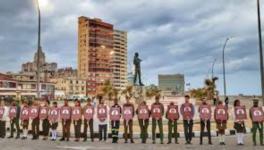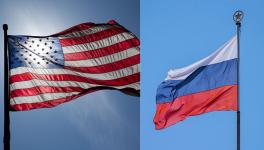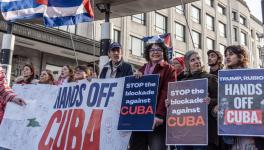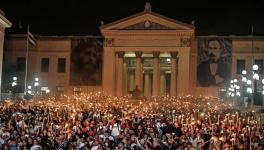Modi-Trump: Friendship Today, Harmful Tomorrow
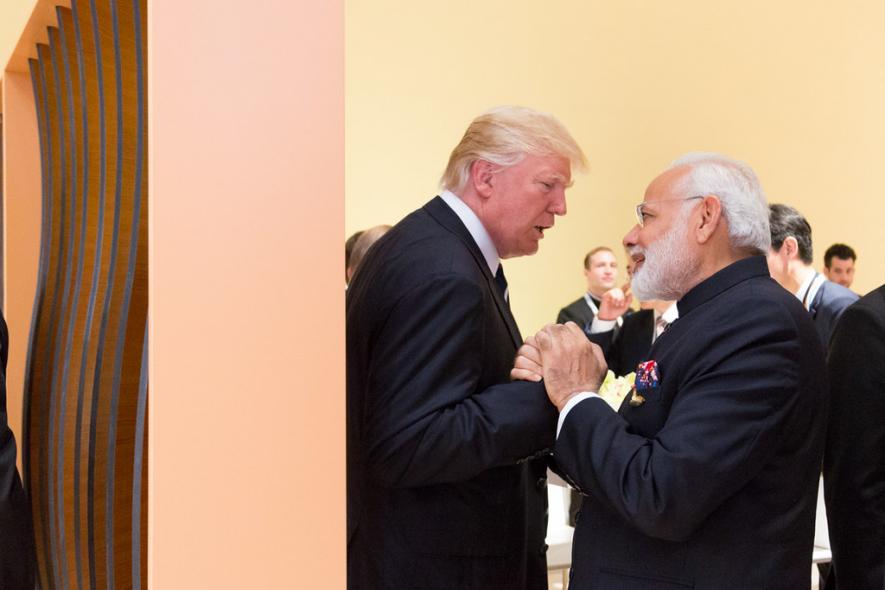
Is the ‘friendship’ between Indian Prime Minister Narendra Modi and United States (US) President Donald Trump for real or does it carry the weight of an entire range of vested interests? Of particular concern is the baggage of the US government’s expansionist policies. US polices are based on a range of peculiar concerns and interests: selling and buying weapons to arms lobbies, exporting warfare technologies that are meant to be used on developing countries such as India and so on. Also remember the US use of troops—this time, perhaps, it will happen in the garb of mediation?
It would be naïve to assume that a friendship with the US will have no strings attached. It is not sheer selflessness or the old-fashioned conventional terms of diplomacy that dictate relations between nations. And especially with the US, friendship always has much to do with extraction, subtraction and intrusion.
In the changing world scenario, all that appears to hold sway is military might and its destructive prowess. The future portends a lone superpower using all possible ploys to extend its territorial intrusion across the world. In playing this game, the word “friendship” is a mere pretext.
Noam Chomsky, the American linguist and philosopher, in a 2001 interview during his visit to New Delhi, had told me as much. In the dark scenario of our present, when the world including India are lurching from one disaster to the next, Chomsky’s words are worth recalling. He spoke chiefly about state-unleashed terrorism in the context of the US. Chomsky had said that just between 1981 and 1989, when Ronald Reagan was US president, state-sponsored terrorists in Central America had tortured, mutilated and killed hundreds of thousands of people, maimed and orphaned millions and left four countries in ruins. During the same years, western-backed depredations in South Africa led to the deaths of 1.5 million people. These do not even include similarly disastrous adventures of the US in West Asia and elsewhere.
Chomsky had pointed out the methods and tools that are typically deployed to make all this happen without inviting the charge that it is, indeed, terrorism. These actions are never added to the annals of terrorism by use of a simple device, which he explained: “The term terrorism, like most terms of political discourse has two meanings, a literal one and a propagandistic one.”
The literal one can be found in the official US documents, which instruct us that ‘the unlawful use of force and violence against persons or property to intimidate or coerce a government, the civilian population, or any segment thereof, in furtherance of political or social objectives. “But,” Chomsky said, “this literal definition cannot be used, because it is a close approximation of official government policy.” Instead, such actions are called “low-intensity war” or “counter-terrorism”.
Thus, the literal meaning of terrorism is discarded for it yields conclusions that are wholly unacceptable. Accordingly, Chomsky pointed out, the “propagandistic version” of the meaning of terrorism is preferred. Herein, terrorism is terrorism only if it is directed against the US and its friends and allies. Reviews of the literature reveal, not surprisingly, that this understanding of the term is close to universal, not restricted to the US. “Even the most extreme regimes that have indulged in mass murder, the Nazi regime in Germany, for example, bitterly condemned terrorism. They even conducted what they called “counter-terrorism’ against terrorist partisans,” he said.
Not just this. According to Chomsky, the US organised and conducted “counter terrorism” in the post-war years, in which it “drew from the Nazi model, which was treated with respect: Wehrmacht officers were consulted and their manuals used in designing post-war counter-insurgency programs worldwide,” he told me. Typically, all such operations were given the name of counter-terrorism.
The American philosopher could therefore foresee the dangers involved in America’s expansionist policies. Yet, he did not consider the threat of terrorism the “only abyss into which we peer”. In fact, he perceives an even greater threat than terrorism in the expansion of the arms race into space. He pointed out that the term “arms race” is inappropriate in this context, for the US was “competing alone” in this race. The goal of the US is to achieve “full spectrum dominance”. Accordingly, plans to achieve such complete dominance, Chomsky said, have been available in US government documents for some years and the projects outlined have been under development too.
No doubt, Chomsky understood that it is a convention everywhere in the world for an attack to be given the name of “defence”. The militarisation of space was no exception to this convention. This explains why the terminology the US for its plans for space was unusual: Instead of calling it militarisation, it was “disguised as ballistic missile defence” or BMD. BMD, as is well understood, if it is to work, relies on satellite communication. That is, it focuses on “..destroying satellites, [which] is far easier than shooting down missiles and that is one reason why the US must seek ‘full spectrum dominance’,” he told me.
The US seeks such a overwhelming control over space, in Chomsky’s words, that the poor man’s weapons will not even be available to an adversary. “The US Space Command is very explicit about it. Clinton-era publications announce the primary goal prominently—‘dominating the space dimension of military operations to protect US interests and investment’, they say. Armies were needed during the westward expansion of the continental United States. Of course, in self-defence against the indigenous population,” he noted.
How I wish that whilst Trump was harping on threats posed by “Islamic terrorism”, he had also made some little mention of state-unleashed terrorism and how instrumental it has been in killing hundreds and thousands across the world and the intransigent violence it brings in its wake. Also, how I wish Prime Minister Modi had brought along details of the Hindutva terror groups to this engagement with the world. These groups are more than flourishing in India, lynching and killing like never before, making targeted attacks on the minority population and vulnerable groups.
Home-grown terror group’s attacks have been rising in India, yet there is little hue and cry. How will there be, when right-wing rulers have openly extended their support to the brigades of goons hell bent on crushing people? How will there be, when alibis are circulated and pretexts floated, constantly monitored and then executed. How I wish any one of the so-called world leaders had focused on the plight of the Kashmiris in India as well—but of course, that is too much to ask, for other hidden agendas drive today’s world.
Humra Quraishi is a freelance journalist and political commentator in Delhi. Views are personal.
Get the latest reports & analysis with people's perspective on Protests, movements & deep analytical videos, discussions of the current affairs in your Telegram app. Subscribe to NewsClick's Telegram channel & get Real-Time updates on stories, as they get published on our website.









